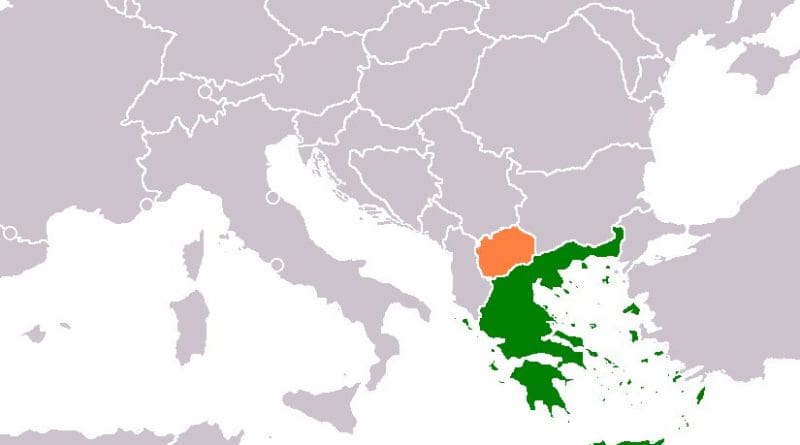Greece: Protests Held Against Macedonia ‘Name’ Deal
By Demetrios Ioannou
Tens of thousands of people on Sunday rallied in northern Greece’s biggest city, Thessaloniki, against a ‘name’ compromise with neighboring Macedonia which they say would hurt their national interests.
At the protest, far-right leaders, Greek diaspora groups and clerics called against any UN-sponsored compromise name for their northern neighbor that would include the term “Macedonia”.
“I feel that what they [both countries governments at the UN talks] are trying to do is not right and that’s why I’m here” Dimitris, 23, from the town of Edessa told BIRN.” I accept any other name than Macedonia” for the northern neighbor.
According to the police, about 90 thousand people attended the rally, many coming from other parts of Greece.
Protesters carried Greek flags and banners saying “Macedonia is Greek” and sang the Greek national anthem and the anthem of Greek Macedonia and chanting the slogan “There is only one Macedonia and it is Greek”.
The protest was organized by a rightist civic movement from northern Greece called “Thermaikos Zero Hour”, [Kinisi Thermaikos Wra Miden] made of opponents to the Greek government led by Alexis Tsipras’s Syriza party.
Photo: Demetrios Ioannou
Although hardline clerics attended the protest, it was not officially supported by the Greek Orthodox Church, which is seen as a big player in the Greek political life.
Archbishop of Athens and All Greece, Ieronymos, after a meeting he had this week with Tsipras, said that he is not going to support any of the upcoming protests, as he has “confidence in the Greek government to handle our national issues”.
The so-called name dispute centres on Greece’s insistence that use of the word “Macedonia” implies a territorial claim to the northern Greek province of the same name.
As a result, in 2008, Greece blocked Macedonia’s NATO entry and has also continued blocking the start of Macedonia’s EU accession talks, despite several positive annual reports from the European Commission on the country’s progress.
The protests in Greece come as Skopje and Athens in December rebooted UN-sponsored talks on their dispute after three years of stalemate.
They have agreed to intensify talks in early 2018, expressing optimism that a compromise solution can be reached in the first half of this year, so that Macedonia can join NATO at the July summit of the alliance.
The US and the EU have welcomed the renewed talks. They are seen as key backers of the mission to find a solution that would both secure Macedonia’s Western integration while also limiting Russian influence in the Balkans.
The organizers said they would stage more similar protests in Thesasaloniki and in other places in the coming weeks, urging Greek Prime Minister Alexis Tsipras to hold a referendum on the use of the term “Macedonia” by the neighboring country if any solution is found.
In an interview published on Sunday, Greek Prime Minister Tsipras, who is expected to meet with his Macedonian counterpart Zoran Zaev in Davos next week, said that “If there is an opportunity for a solution, it would be a national stupidity not to make good use of it.
This is not the first time that Greeks rally against their neighbors’ name. In February 12, 1992 a massive protest in Thessaloniki, declaring that “Macedonia is Greek”, gathered an estimated crowd of one million people.
In order to become member of the United Nations, Macedonia accepted the provisional term Former Yugoslav Republic of Macedonia, FYROM, which is still in use pending a solution to the spat. Greek citizens use this term when reffering to their northern neighbor.


Macedonia should be able to call itself whatever name it desires! This a pitiful and pathetic reason to waste time, energy and money for a useless demonstration. It seems the demonstrations are for no other purpose then demonstrating!
Nationalism is not a “waste of time, energy and money.” People need to be educated about the history of the region to understand the serious implications this has.
According to international law you are right but it is also the right (obligation even) of Greeks to protest against the falsification of history, particularly when this has the potential to threaten Greece’s territorial integrity. Macedonia has been nothing but a geographical region for more than two millennia (putting aside for the sake of argument, the very existence of the Greek Macedonian Kingdom 3500 years ago). The idea of a “Macedonian nation” however is an absurd invention of the Bulgarians initially and the communist leader Tito thereafter, with the sole purpose of raising claims on all lands of modern Macedonia. With 50% of that region in today’s Greece and a suppressed Greek minority of 100 thousand people within FYROM, this was the least the Greeks could do for now.